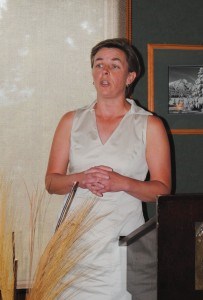
The federal minister of the status of women poured cold water on the idea of a national inquiry into murdered and missing aboriginal woman, July 10.
Responding to numerous questions from members of Jasper’s business community, Kellie Leitch, the minister of labour and minister of the status of women, said the government prefers to take immediate action, rather then waiting years for an inquiry to be completed.
“Families asked for action, not for another study,” said Leitch, during a Jasper Park Chamber of Commerce meeting at Pyramid Lake Resort.
“A national inquiry is about having a number of lawyers go through a number of documents and give us feedback and advice, which may take another three years. I wasn’t willing to wait for another woman to be murdered or to go missing in that timeframe when we can take action with that money and make sure it doesn’t happen again.”
On June 2, the Truth and Reconciliation Commission published a 383-page report that detailed the historical legacy of the residential school system and put forward 94 recommendations to address the lasting impact of the school system, as well as improve the plight of Aboriginal peoples and restore relations between Aboriginals and other Canadians.
One of those recommendations was to initiate a public inquiry into missing and murdered Aboriginal women and girls.
Citing an RCMP report released in 2014, between 1980 and 2012, 1,017 Aboriginal women and girls were killed and 164 were missing. Two hundred and twenty-five of these cases remain unsolved.
“More research is needed, but the available information suggests a devastating link between the large numbers of missing and murdered Aboriginal women and the many harmful background factors in their lives,” the report states, pointing to domestic and sexual violence, racism, poverty, poor education and health opportunities and an overrepresentation of children in child-welfare care.
“This complex interplay of factors—many of which are part of the legacy of residential schools—needs to be examined, as does the lack of success of police forces in solving these crimes against Aboriginal women,” the report states.
In 2014, Leitch said she travelled across the country and met with more than 55 families that either had a family member who was still missing, or who was killed.
“What most Canadians don’t know, because the press hasn’t covered it, is in September of 2014, as the lead minister, I published an action plan that has funded $200 million to eradicate these heinous crimes,” said Leitch.
This five-year Action Plan to Address Family Violence and Violent Crimes Against Aboriginal Women and Girls focuses on three areas: preventing violence, supporting Aboriginal victims and protecting Aboriginal women and girls.
The money will go toward creating community safety plans, projects to break the generational cycle of violence and abuse, projects to engage men and boys and empower women and girls to denounce and prevent violence, victims services and actions to share information and resources with communities and organizations.
“That’s what families asked for and that’s what we’re delivering on,” said Leitch.
Paul Clarke
[email protected]
